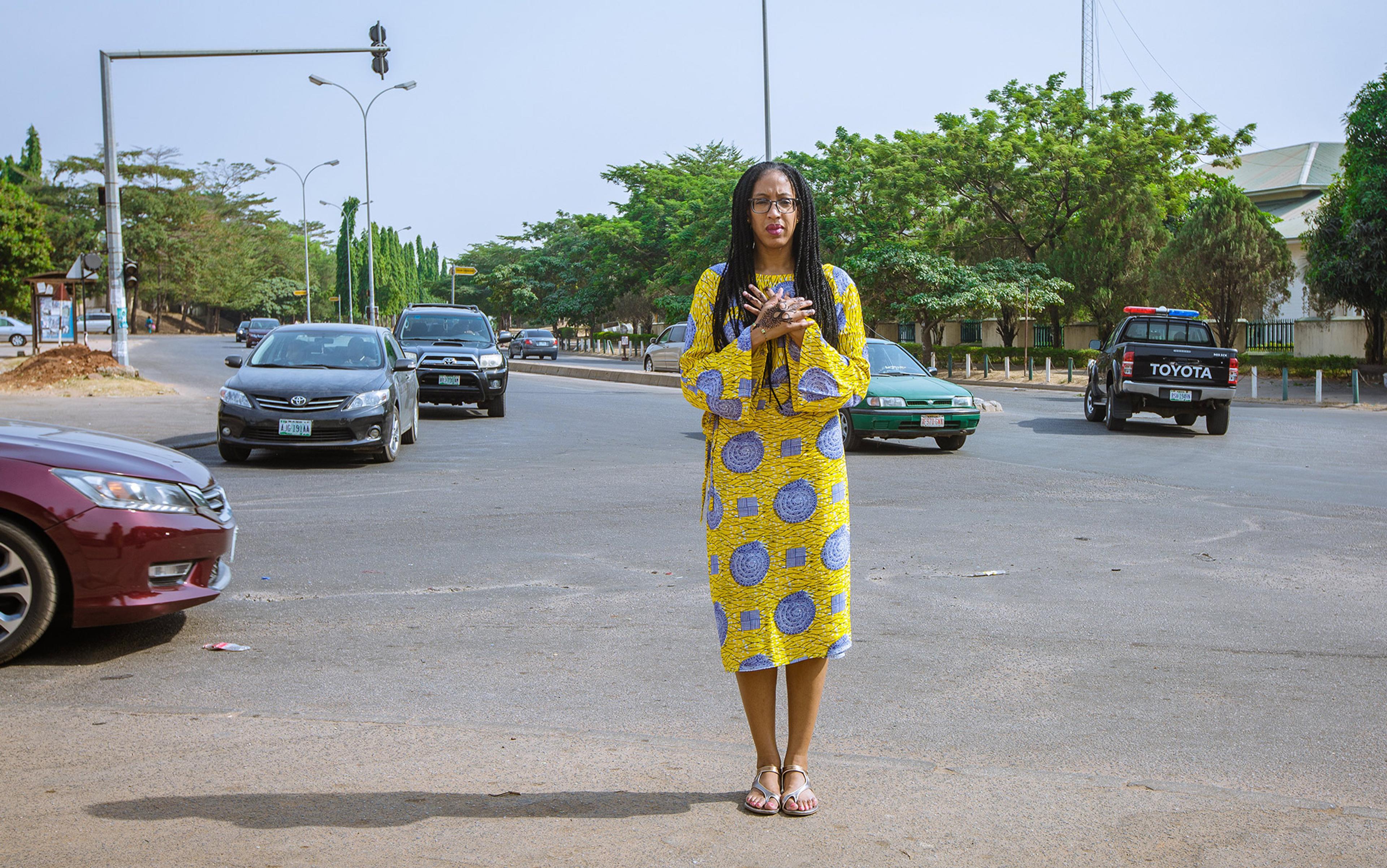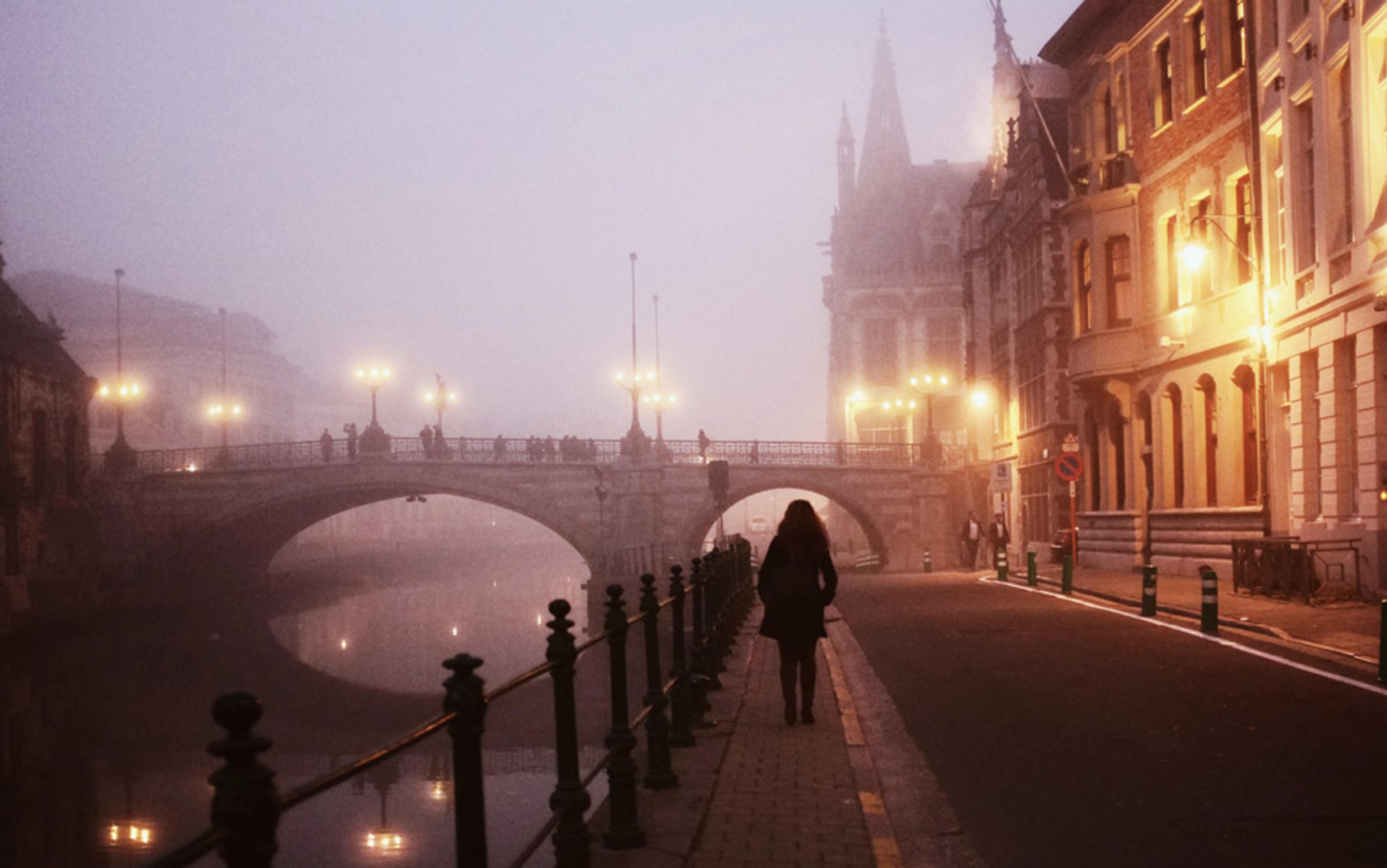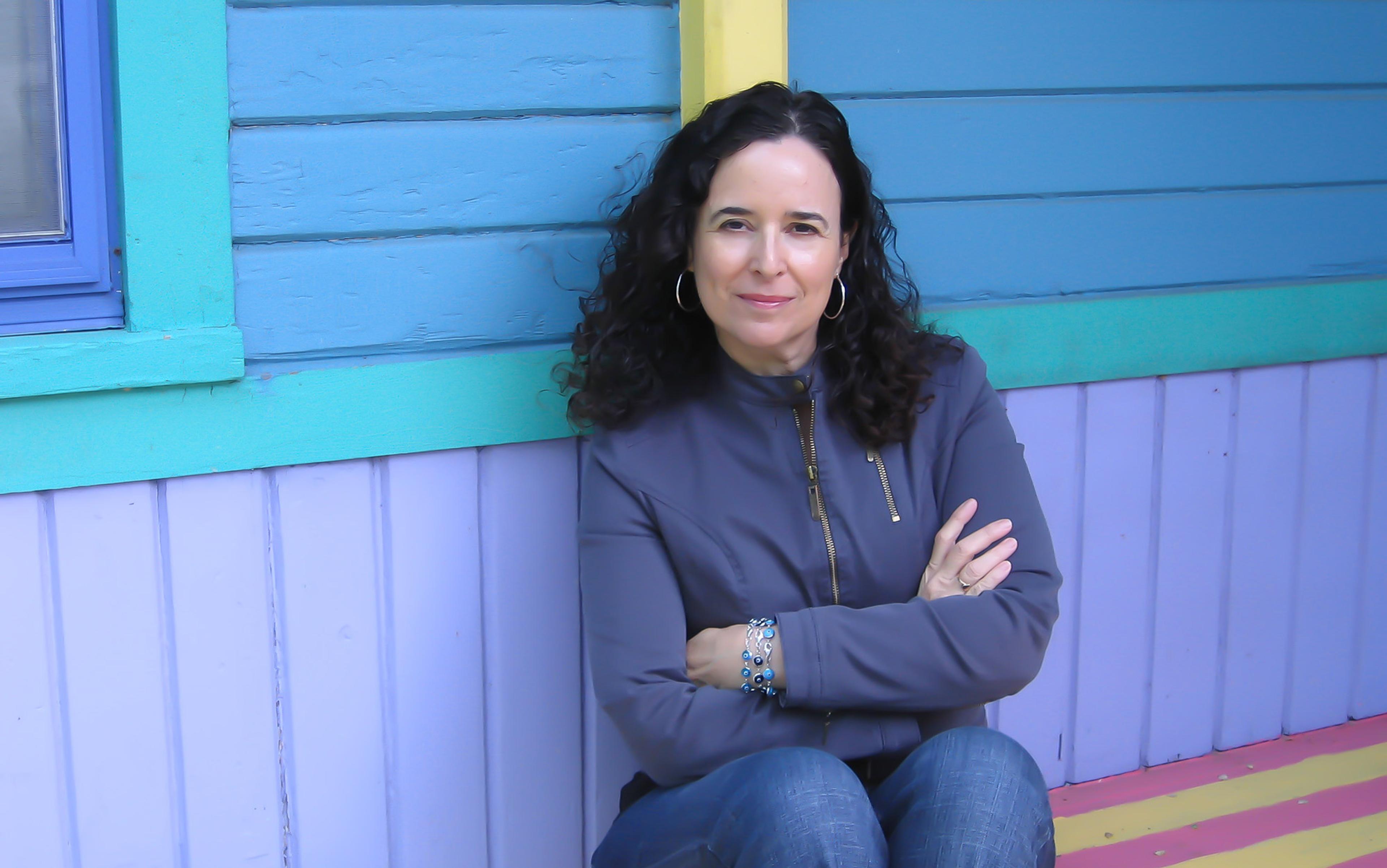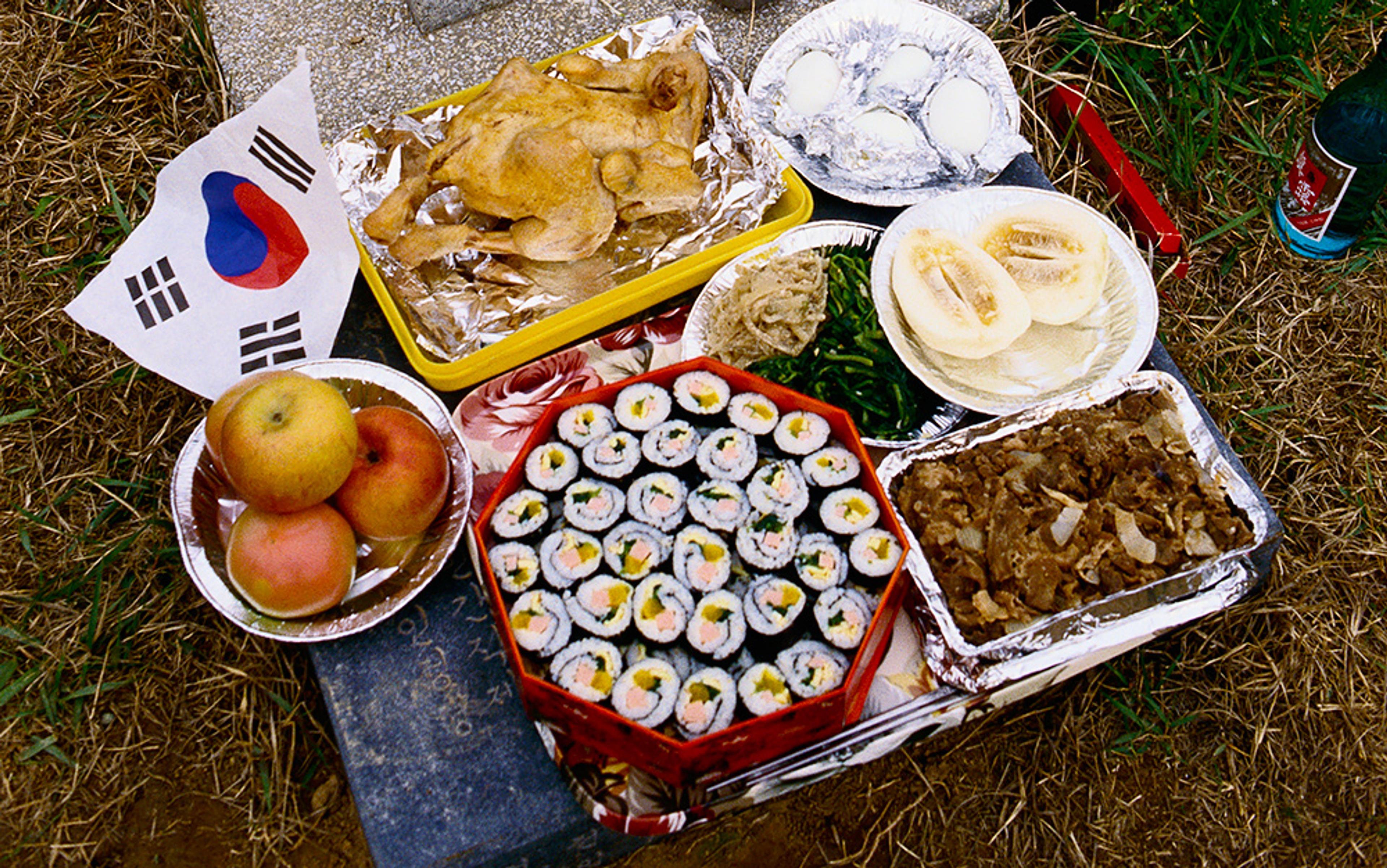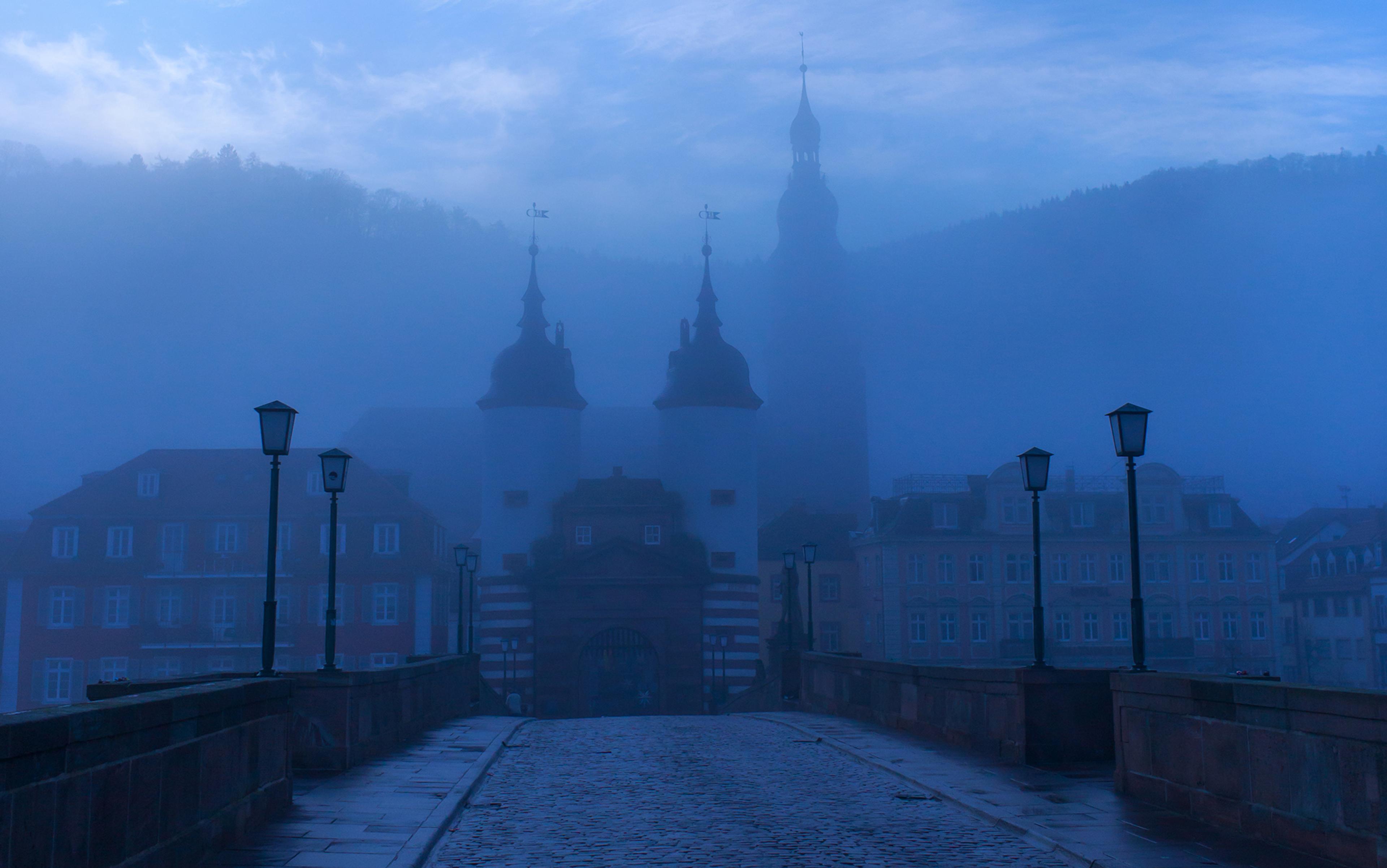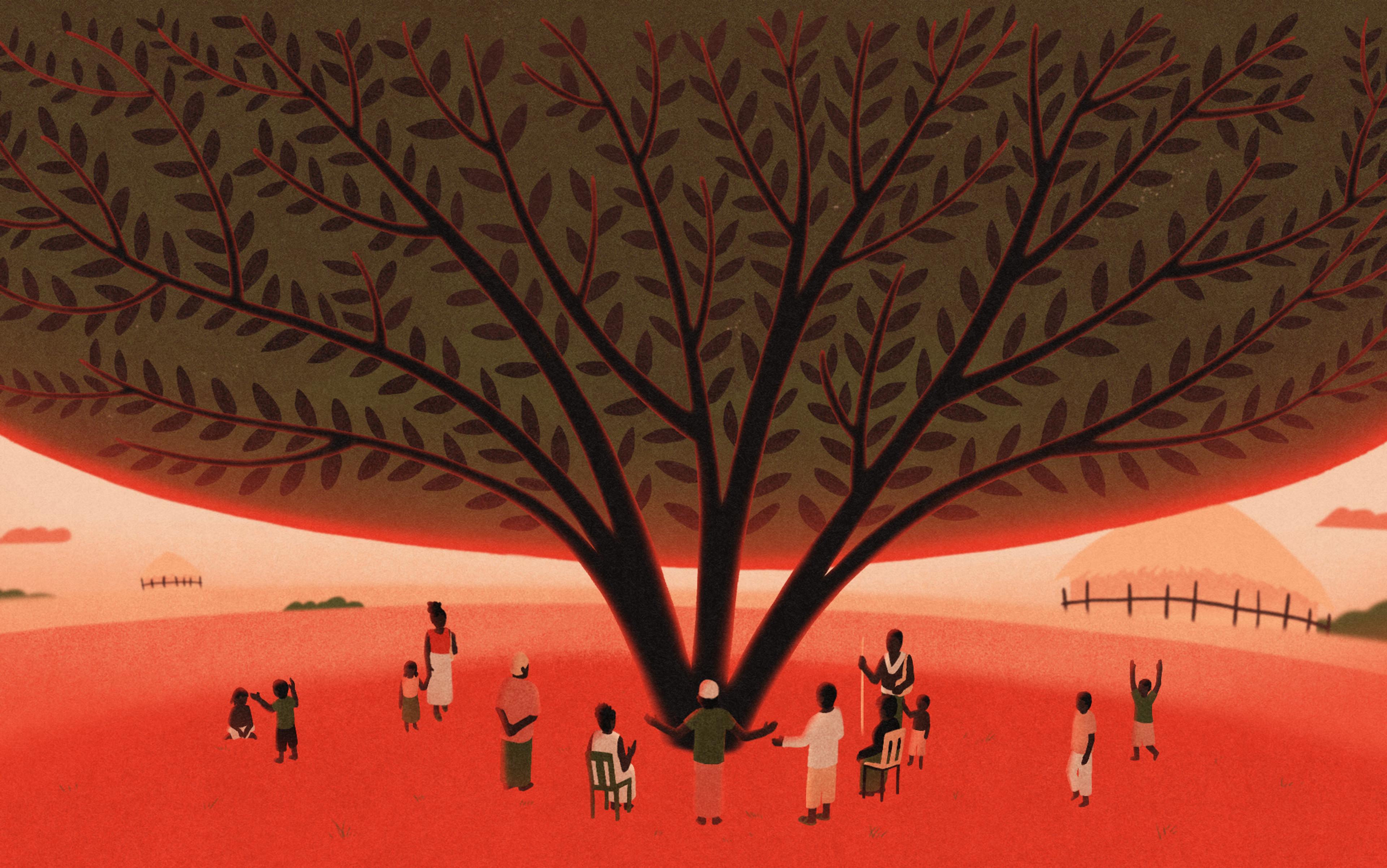‘Oh, you are beautiful.’ The security official tilts her head and breaks into a broad smile, a toothpick caught in the side of her mouth. The loose ends of her cornrows peek out from the back of her navy beret. The cotton of her light blue button-down is taut against her stomach. She is leaning casually against the X-ray machine as my items pass through on the conveyor belt. The line of people is filling up behind me, their groans and sighs increasing as the voice over the intercom announces yet another delay.
‘Thank you,’ I say to the official. I assume she is looking for a weekend blessing, a few hundred naira to make the morning’s efforts worth something. I am travelling back to Abuja from a work trip to Lagos and, already, two airport officials have asked me for ‘something for the weekend’.
‘Are you mixed?’ she asks, still smiling. She looks sincere.
‘No.’
‘Where are you from?’ Her tone is curious and teasing. There is no accusation, no questioning of my right. But still, my back stiffens instinctively. I prepare my armour.
‘Imo.’ I step up as the passenger ahead of me moves. I am rehearsed in this routine and anticipate her next question.
‘Both your parents are Nigerian?’ Her voice is a pitcher of disbelief pouring over my black tote and gold sandals coming off the conveyor. I busy myself looping my thin animal-print leather belt through my black cigarette trousers.
‘Yes,’ I force a smile back, barely looking at her. I am used to this question. I am not used to how it makes me feel.
Her smile breaks into a laugh as she tilts her head back before gazing at me more intently. ‘I na asu Igbo?’
‘No.’ I do not speak my own language. I pick up my tote and walk away before she can call me oyibo.
‘Oyibo.’ It means ‘white man’. I read somewhere once it means ‘no skin’. When I first came back to the country months ago, it was harder, this being called foreigner, this being called white. I had just left the United States, a country determined to beat into such people as me that I am anything but white, that I am anything but welcome. I do not want this naming. Not in my own country. Not anywhere. I am brown like them, my people. But no one says: ‘Welcome home.’ In airports, hotels and supermarkets they say: ‘Where are you from?’ And when I answer, they shake their heads in refusal.
‘It is not possible.’
‘You are not Nigerian.’
‘It is a lie.’
‘Your own yellow is different.’
It is a new day. I have to renew my Nigerian passport. I have asked my aunt for a contact at the immigration office so it doesn’t take me a million hours to do a simple task. Yahaya, the driver, slows down as we near the entrance, and then brings the car to a complete stop. There is a young man in a light brown uniform with a rifle slung loosely across his shoulder inspecting the car directly in front. He waves that driver through the gate, and motions for us to move forward. I glance down at my office ID card in my hand making sure it is the right face up and that my Igbo name is clearly visible. It is one small way of letting him know that I am Nigerian. I catch his eye from the backseat as he saunters over to my open window, rests his arm casually on the car and bends to peer in at me. He is flirting. Every smile in this place is textured. I am learning to feel out the lines, to read curves like braille.
‘Madam, you are welcome.’
‘Thank you. I have an appointment.’
‘To see who, Madam?’ His eyes smooth over my body like someone icing a cake. I clutch my ID tag tighter and lift my hand slightly to make it more visible.
‘Mrs Anyanwu.’ On the drive over, I had practised saying the immigration official’s name out loud to Yahaya over and over, until I got the pronunciation right, until my American accent didn’t betray me.
It does not matter that I have come back. In his eyes, I am different. I am American. I might as well have no skin
He nods his head slowly and glances towards the driver: ‘Brawse, open the boot.’ He snakes away from my window to inspect the boot, his wet smile dripping on my blouse. The car shakes when he slams the trunk shut, and then he is up at Yahaya’s window. ‘Na oyibo?’
‘No be full o. Na half.’ I am sitting in the backseat as they negotiate my identity between them.
‘Oya, make you drop am for main building then go park for side.’ He waves us forward, nodding at me in the backseat.
As soon as the car moves I speak: ‘Yahaya, why did you tell that man I was half oyibo?’
‘Aunty, is it not so? You are not like us now?’ He means to say I am not fully Nigerian. I was not raised here. I do not even speak the language of the people I am trying to claim. It does not matter that both my parents are from the East. It does not matter that I have come back. In his eyes, I am different. To Yahaya, my driver born in Kogi state – who has lived in northern Nigeria his entire life, and is fluent in his native Igala, in the regional Hausa and in the Queen’s English – I am American. I might as well have no skin.
We are driving back to my office. We stop at Berger junction. I gaze out the window past the sludge of stalled green taxis and the cluster of people standing haphazardly along the side roads. I catch myself wondering how I came to live here, in this home that is not yet my home. Five months have passed since my returning. I am worn. When my people deny me, I no longer labour with insistence. I shrug my shoulders. I shape my lips into plastic lines. I do not argue with them to claim me. I had not thought about not fitting in. I had thought only of a home.
‘It is your birthright.’ She says it firmly, staring at me over her wine glass. My Ghanaian friend, she was born and raised, like me, in another man’s land. I am visiting her home in New York City. I have left Nigeria again, my sixth time in nine months. She tells me: ‘To be Nigerian is your birthright. No one can tell you what it means to be Nigerian. You get to discover that on your own.’ Her version is trimmed with indignant hope.
Back in Abuja, I sit outside at the one café where the coffee is strong and costs less than $3. I have made a new friend over the past two weeks, Jamal.
‘You don’t want to settle here permanently do you?’ Jamal slouches in the wicker chair, a cigarette hanging loosely from his right hand. His great-grandfather came to Nigeria in the 1920s from Lebanon. Jamal was born and raised in Kano. He knows more of this country, it seems, than I ever will. I shrug. ‘Not sure. Let me just get through this first year.’
‘Have you spent much time in Lebanon?’ I ask.
‘I lived there for one year. But that was enough. They are like here, you know, just want to take from you. Once I learned that, I just came back.’
‘So you don’t have any allegiance there?’
‘What is Nigerian? Who is Nigerian? There is no such thing’
‘I used to, you know.’ He sits up and puts out his cigarette in the ceramic bowl on the table between us. ‘I used to have such a strong allegiance, like very, very strong. But then I went and saw how they treated me because I had just come. I didn’t need that shit.’ He waves his arm dismissively in the air: ‘Fuck that. I left.’
I say nothing. I marvel slightly at the ease by which he can throw away his Lebanese identity. The uniformed gateman walks past us just beyond the patio. Jamal calls out and says something to him in Hausa. The man stops, faces Jamal respectfully and replies. When they are finished I ask: ‘So you consider yourself fully Nigerian?’
‘What is Nigerian?’ He looks at me squarely and laughs. He reclines back in his chair. ‘Who is Nigerian? There is no such thing. He does not think I am Nigerian.’ He lifts his head slightly in the direction the gateman has taken. I understand. It took me less than a month to recognise that people here identify you by your ethnicity first.
My friend Bayo emails me from Washington. He left Nigeria when he was a baby and came back to visit only 30-odd years later. He has his own work. He writes to me: ‘I know I’ve told you that this leaving America, this moving back, it’s a massive leap of faith. I respect you for it, but you’ve never told me why you’ve decided to move to Nigeria now.’
I do not respond right away. I do not know yet how to arrange my words for an answer. A month passes. I write to Bayo:
I didn’t tell you because how could it be enough to say that the earth there was fragile and cracking, and I was falling through gravel and soil, and slipping between those spaces that separate continents. Or even to say simply that I was lost. In America I felt home less. If I make it two words it sounds less offensive to apply it to myself, I who am rich by global standards. Remember how global means beyond America? AFROPOLITAN. I don’t like that word they use to describe us. It is a weak and leaky word that lets the challenge and the trial drip out from what is a much more complicated thing. There is little chic about being from two countries, both of which struggle to claim you.
I can write this way to Bayo. He knows what it means to straddle narratives. He knows that leaving home and coming home are full of unstitchings. I started leaving the US in fragments, through small undoings that came with each trip away over the course of two years. Each time, I stepped out of the country and remembered that there were other ways to live and to be seen in the world. And when I had finally come undone, I left because I could no longer stay there without sinking into a thickening mire of anger towards a system of deep and increasingly blatant racial injustice. I left because my bent towards creative writing was straightening into a rigid pole of polemic op-eds. I left because I was tired of the false narrative of Whiteness.
My heart twists still. It is purple-blue bruised and ugly – what is happening back home, in the US
I am here now, in this other country, the place that should be my home, trying to see kinsmen in strangers. I am here wondering if it is possible for someone like me to call just one place home, if it is necessary or vital? I am here wondering if I can really just get up and leave the US, the place of my birth, because I’m exhausted by the race problem? I try to settle in, oceans away from the country where a white teenage boy once asked his pastor if it was okay with God that my then (white) boyfriend was dating me, a black girl.
I listen and watch what is happening to this place that birthed me, this self-proclaimed home of the free and land of the brave. I watch what happens to others who look like me, who are also born there. Who call the US their home. Eric Garner, the father in New York, choked to death by police. Michael Brown, the student in Ferguson, shot to death by police. Tamir Rice, the child playing in the park in Cleveland, shot and killed by police. I watch the tension rise like smoke from a forest fire, thick and suffocating and billowing black. I thought it would be different watching from the outside, no longer living there. But my heart twists still. My mouth dries up. My stomach plunges like I’ve swallowed rocks by mistake, the way flies get in where the air is rancid. It is purple-blue bruised, swelling and ugly – what is happening back home, in the US.
Transnational. Afropolitan. Multicultural. Global citizen. Third Culture Kid. There is always a name that fits like a copied dress from a bad tailor. I was an African in the diaspora, a US citizen with more than one allegiance. Here, I am a returnee. I have come back only to discover a different way to not belong. An unprecedented sadness that fans wild like flora in a sea of constant becoming. That is what I did not expect. When you are raised away from your home country, your native home (what do you call it?), and you decide to move back as an adult, there is no real preparation for the emotional shock of feeling out of place in the space that is supposed to be yours. There is no warning of the mourning that will seep. It cannot be undone.
There is part of my identity as a Nigerian, as an Igbo girl that can never be reclaimed. It is the part that comes with regular childhood visits to my father’s village, with being taught Igbo at the same time I was learning English, with days in the kitchen as a young girl watching my mother and aunts and older cousins chop up okra for my favourite soup. I will tell others about this, about the unexpected grief, about the mourning, others who want to come back but who have never really been. I will say: ‘Expect to grieve because you will come to understand how much was lost when they took you towards what they thought was a better life.’
I land in another airport. The large letters spell out words I pronounce poorly: Akanu Ibiam International. This is Enugu. This is the East. Igboland. I stare at everything. Nostalgia surprises me. I have not known this city, here where my mother traipsed off to elementary school, where she went from a girl to a woman, where her marriage began. Something in me splits open and the amber dust, the hills and their narrow roads, the banana leaves spilling over high walls, they bleed into my spirit and flow through me like a prayer.
On my own, I do not have all the pieces to tell the story, my own story. That is what I have discovered mostly. I have dug in my heels and broken earth in other countries, without any significant ties to this country and to the region where my parents and grandparents were raised, where they learned how to make sense of the world. Nigeria is the place that grew the people that made me. Sacred ground. Here, where there is so little to rely on, no healthcare, no steady electricity, no trustworthy security, and no government that seems to care for its people. I ask myself quietly, can this be sacred ground?
How do you confess aloud that you come from a place that unstitches you?
‘You children need to understand Igbo.’ That is what I wish they had said to me growing up, the people that made me. I wish my parents had spoken that language, their language, to us. I wish that when I said my own name it sounded like it came from the soil where my mother was planted. I have not grasped what it means to have been sown, to grow from a patch of earth that receives you as its own.
At night, when it feels more difficult to understand why I am here, why I felt pulled back to a place I’ve never known, I recite the things for which I am grateful. I assure myself that I do not have to understand it all to stay. I just need more days and months to acclimatise. I trust my gut, that coming was the right decision, even with the pain, the type that is still so hard to speak of and to admit. How do you confess aloud that you come from a place that unstitches you?
‘Mgbe onye tete bu ututu ya.’ Ngozi, my new friend sends me a text in Igbo. We have discovered we are from the very same village on our paternal side. She vows to ask her father if we are related. She believes we must be. I read her text, the one she assumes I will understand. I text her back and ask her to translate. She calls me instead, laughing.
‘Are you serious?’ she says. I am serious. I want to tell her to stop laughing. But I laugh with her.
‘Just tell me what it means.’
‘When you wake up, that is your morning.’ She continues: ‘You know Igbo is full of proverbs, right? It’s how we say it is never too late to do your own work, or achieve what you have to achieve. Everybody’s timing is different.’
My stomach responds before the tears fall. It is exactly what I needed to hear. But that is not why I am crying.
It is the first time that God has spoken to me in Igbo.
